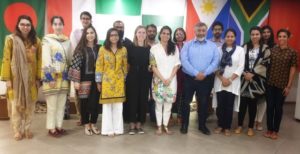
How can we provide low-cost and sustainable interventions for people living with mental health conditions in low-and-middle-income countries (LMICs), where there is often limited funding and services available to provide specialized mental health services? This is essential in order to meet the Sustainable Development Goals around health, specifically 3.4 which targets promoting mental health and wellbeing.

Instead of establishing new and expensive services for people with severe mental illnesses, we refined and tested interventions that use already existing resources in relationships with healthcare professionals (DIALOG+, an approach to make routine meetings effective), in families (multi-family groups) and in communities (befriending through volunteers).
Our research across six countries on four continents suggests that these interventions are feasible, experienced as positive and beneficial for patients. Thus, resource-oriented interventions present a realistic option to improve care for people with severe and common mental illnesses across LMICs.
Background

Mental illness presents a major burden to societies with substantial distress to affected individuals and high costs for health services. In LMICs this may be made worse by a lack of human and financial resources to provide specialized mental health care for people affected by mental illness. Resource-oriented approaches that support patients to draw from existing resources within themselves, and from relationships with their families, friends and communities, can be beneficial in helping people to overcome the distress of mental disorders and be sustainably implemented in low-resource settings.
The NIHR Global Health Research Group on Developing Psychosocial Interventions for Mental Health Care (the GLOBE study) explored how three resource-oriented interventions could be used to support mental health care in six LMICs.
- DIALOG+ is an intervention delivered on a tablet computer which is designed to make routine meetings between patients and mental health professionals therapeutically effective.
- Multi-family Groups brings together in a group several patients, their families or friends and healthcare professionals to promote mutual learning through the sharing of support and experiences.
- Volunteer Befriending links unpaid volunteers with individual patients or in a group to provide psychological, practical and social support.
How the research was conducted

We conducted 13 studies incorporating both randomized controlled trials (RCTs), open controlled trials and open non-controlled trials in six countries: Argentina, Bosnia-Herzegovina, Colombia, Pakistan, Peru and Uganda. The interventions were all delivered over a period of 6 months, with the option to receive a further 6 months of flexible sessions in Bosnia and Herzegovina, Colombia and Uganda. Both quantitative and qualitative data were collected to explore whether the interventions were effective, feasible and acceptable to participants.
An additional three 3-month non-controlled studies were conducted in Bosnia and Herzegovina, Colombia and Uganda and recruited 117 patients from primary care clinics with chronic physical conditions. The results showed significant improvements with large effects on quality of life and symptoms of anxiety and depression after three monthly meetings.
Key findings
Improved quality of life:
- Participants who received one of the three interventions for a period of at least 6 months reported better subjective quality of life.
Reducing symptoms:
- Most countries saw a reduction in psychological symptoms after participants received one of the three interventions.
- Prehospitalization rates were found to be reduced in Bosnia and Herzegovina and Colombia in patients who received the Multi-family Groups intervention.
Feasibility and acceptability:
- All interventions were able to be implemented successfully at no-to-low cost with minimal training required.
- In Argentina, DIALOG+ was delivered remotely due to ongoing COVID-19 restrictions, and this was shown to be a feasible and acceptable mode of intervention delivery.
- Intervention sessions were generally well attended and positively experienced by participants, who reported that they boosted self-esteem (DIALOG+), reduced stigma (Volunteer Befriending), and were a safe space to allow for shared learning (Multi-family Groups).
Conclusions

Resource-oriented interventions are a feasible and effective treatment for patients with mental illnesses in a range of resource-limited contexts. Whilst all interventions were beneficial, their precise effect varied and some interventions made a substantial difference to the quality of life of patients, much larger than seen in studies conducted in higher-income countries. DIALOG+, Multi-family Groups and Volunteer Befriending are all scalable solutions. They are less resource-intensive than other interventions as they are low-cost, require minimal training to implement and do not require specialized services. DIALOG+ is able to be delivered remotely, which can be beneficial in situations limiting mobility, for example, any future restrictions imposed by the COVID-19 pandemic. Further research is required to assess how the interventions may be scaled up in other LMICs with similar settings.
Links to further information
Please visit the project website for more information on the partners, activities, and outputs, including all scientific publications: https://www.qmul.ac.uk/nihr-ghrg/
For more information and to access the DIALOG+ intervention: https://www.elft.nhs.uk/dialog
DIALOG+ in GLOBE animation video: https://youtu.be/h1Kxj_GSx4Y
The ISRCTN registrations this blog refers to:
Bosnia and Herzegovina:
- ISRCTN13347129: A research study in Bosnia and Herzegovina to test an intervention called DIALOG+, designed to improve care for people living in the community with severe mental illness
- ISRCTN51290984: A research study in Bosnia and Herzegovina to test an intervention called Volunteer Support, designed to improve care for people living in the community with severe mental illness
- ISRCTN13347355: A research study in Bosnia and Herzegovina to test a Family Involvement intervention, designed to improve care for people living in the community with severe mental illness
- ISRCTN17003451: A research study in Bosnia and Herzegovina to test the acceptability and feasibility of an intervention called DIALOG+, adapted to improve care for people in primary care with poor physical and mental health
Colombia:
- ISRCTN83333181: A research study in Colombia to test an intervention called DIALOG+, designed to improve care for people living in the community with severe mental illness.
- ISRCTN72241383: A research study in Colombia to test an intervention called Volunteer Support, designed to improve care for people living in the community with severe mental illness
- ISRCTN11440755: A research study in Colombia to test a Family Involvement intervention, designed to improve care for people living in the community with severe mental illness
- ISRCTN14018729: A research study in Colombia to test the acceptability and feasibility of an intervention called DIALOG+, adapted to improve care for people in primary care with poor physical and mental health
Uganda:
- ISRCTN25146122: A research study in Uganda to test an intervention called DIALOG+, designed to improve care for people living in the community with severe mental illness
- ISRCTN78948497: A research study in Uganda to test a Family Involvement intervention, designed to improve care for people living in the community with severe mental illness
- ISRCTN86689958: A research intervention in Uganda to test an intervention called Volunteer Support, designed to improve care for people living in the community with severe mental illness
- ISRCTN50335796: A research study in Uganda to test the acceptability and feasibility of an intervention called DIALOG+, designed to improve care for people in primary care with poor physical and mental health
Argentina:
- ISRCTN38851969: A research study in Argentina to test an intervention called DIALOG+ designed to improve care for people living in the community with severe mental illness
Peru:
- ISRCTN38360953: A research study in Peru to test an intervention called DIALOG+ designed to improve care for people living in the community with severe mental illness
Pakistan:
- ISRCTN14528579: A research study in Pakistan to test an intervention called DIALOG+, designed to improve care for people living in the community with common mental disorders
- ISRCTN12299326: A research study in Pakistan to test a family involvement intervention, designed to improve care for people living in the community with common mental health conditions
Acknowledgement
This research was funded by the National Institute for Health and Care Research (NIHR) (NIHR Global Health Group on Developing Psycho-Social Interventions) grant number 16/137/97, using UK aid from the UK Government to support global health research. The views expressed in this publication are those of the author(s) and not necessarily those of the NIHR or the UK Department of Health and Social Care.

Comments